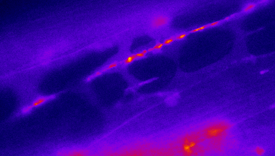
Peri Kurshan, Ph.D.
Assistant Professor, Albert Einstein College of Medicine
SFARI Investigator WebsitePeri Kurshan is an assistant professor in the Dominick P. Purpura Department of Neuroscience and the Department of Genetics at Albert Einstein College of Medicine. She completed her undergraduate degree in neuroscience at Brown University and obtained her Ph.D. in neuroscience from Harvard University, under the mentorship of Thomas Schwarz, studying synaptogenesis in Drosophila. She performed her postdoctoral work at Stanford University in the lab of Kang Shen before joining the faculty at Albert Einstein College in 2019.
Changes in the development and function of synapses lead to neurodevelopmental conditions such as autism spectrum disorders; however, the molecular mechanisms underlying these processes are still largely unknown. Kurshan’s group uses the nematode C. elegans, which has a simple and stereotyped nervous system and whose connectome has been fully mapped out, to investigate the conserved molecular mechanisms of synapse development.
In particular, they study how presynaptic components, including cell adhesion molecules, active zone scaffold proteins, calcium channels and synaptic vesicles arrive at the synapse and form a mature and fully functional presynaptic compartment. The lab combines the power of worm genetics with high-resolution imaging and optical physiology readouts to elucidate the role of key molecules.
These approaches have led to discoveries suggesting that the role of synaptic cell adhesion molecules, such as neurexin, may be different than initially hypothesized. Specifically, Kurshan and colleagues showed that neurexin’s role in presynaptic development is independent of extracellular activation and downstream of other initiating factors. Kurshan’s lab is well poised to build directly on this finding by identifying and characterizing the molecular pathway by which neurexin functions.
The lab’s overarching research goal is to understand how synapses are assembled and how defects in this process lead to neurodevelopmental disorders such as autism spectrum disorders.
